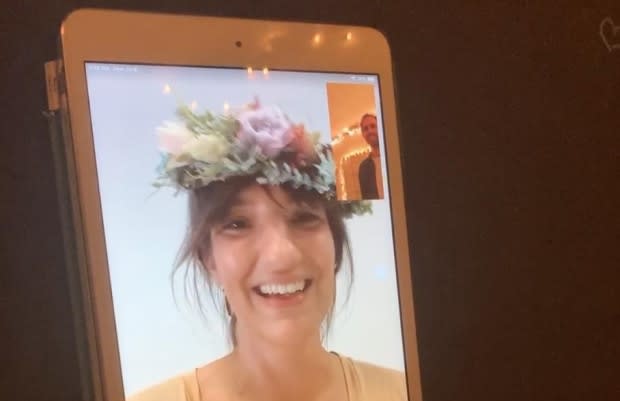Canadian-American couple who wed over FaceTime devastated that Canada won't recognize marriage
A Canadian-American couple were devastated to discover that Canada won't recognize their marriage, performed with only the groom present at the wedding while the bride participated via FaceTime.
"It broke my heart," said Lauren Pickrell, 35, of Windsor, Ont. She has been separated from her American partner, Mark Maksymiuk, since early March due to COVID-19 travel restrictions.
The couple had hoped that by getting married, they could reunite in Canada, which allows American spouses to enter the country.
"I had really high expectations because I felt in my heart that we did everything right," Pickrell said.
She and Maksymiuk, 32, were legally married on July 6 and have a valid marriage licence from the state of Kansas.
The catch is that only Maksymiuk was physically present at the official wedding ceremony in Kansas City, Kan. Pickrell later participated via FaceTime in an informal ceremony for the couple, held at a chapel in neighbouring Kansas City, Mo. Kansas City straddles the two states.

U.S. immigration law will recognize marriages in which only the bride or groom was physically present at the ceremony — known as a proxy marriage — once the couple physically unite.
Canada, however, is not on board. Maksymiuk said he discovered this when he tried to enter the country and explained the details of his proxy marriage when questioned by a border officer.
"His exact words were, 'You know, we don't view this type of marriage as valid,'" said Maksymiuk, who was denied entry to Canada. "I was crying. I broke down."
Proxy marriages legal in Kansas
Maksymiuk lives in Royal Oak, Mich., about 26 kilometres from Pickrell's home in Windsor. Despite the short distance, the couple remain apart.
To help stop the spread of COVID-19, Canada has banned foreigners from entering for non-essential travel. On top of that, the U.S. land border is closed to Canadian visitors. Canadians can still fly to the U.S., but Pickrell said she can't get enough time off work right now to travel and then self-isolate for two weeks upon her return.
Canada recently loosened its travel restrictions to allow immediate family to enter, including spouses and common-law partners.
Committed couples who don't meet the criteria have scrambled for solutions, including marriage — if they can get to the same location.

Pickrell and Maksymiuk searched for a possible alternative and discovered a little known fact: Couples can legally marry in Kansas in a proxy ceremony. The two decided to give it a shot.
"If you really love someone, you do whatever it takes," Pickrell said.
Henry Chang, a business immigration lawyer in Toronto, said Kansas wound up legalizing proxy marriages by neglecting to spell out in the law who must attend the wedding.
"They just forgot to mention that both parties had to be present in order for the ceremony to be legal," said Chang, a partner with the law firm Dentons.
"Because of that, it's implied that you can get away with it."
Groom denied entry into Canada
To seal the deal, Maksymiuk flew to the state of Kansas, where he obtained a marriage licence and attended a proxy ceremony in Kansas City, Kan., set up by Your Magical Day wedding chapel, which specializes in proxy marriages. Your Magical Day then held an informal ceremony for the couple at a nearby chapel in Kansas City, Mo.
"It's in a strip mall," Maksymiuk said. "It almost feels like you're walking into a doctor's office, but there's, like, ribbons and bows and stuff on the wall."
Pickrell appeared via FaceTime on an iPad. At the time, she was at her job as a kitchen supervisor at a restaurant just outside Windsor. Her boss and co-workers joined her for the ceremony while her family tuned in from Montreal.
"It was perfect," Pickrell said. "I never wanted to have a big wedding."

But things fell apart five days later at the Detroit-Windsor border when Maksymiuk tried to enter Canada and was denied entry.
"It was absolutely devastating," he said.
In 2015, Immigration, Refugees and Citizenship Canada (IRCC) stopped recognizing proxy marriages unless the bride or groom is a member of the Canadian military.
IRCC told CBC News that it made the change due to concerns that proxy marriages could involve an unwilling spouse who never consented.
Maksymiuk said the government's position is frustrating, as he and Pickrell have been in a committed relationship for almost five years.
"It doesn't seem right or fair."
What are the options?
Chang, the Toronto lawyer, said Maksymiuk would likely be allowed to enter Canada if he and Pickrell redo their wedding ceremony in the U.S. — together.
"Unfortunately, that's the only way to save it."
Because that's currently not an option, the couple hopes the federal government will broaden its immediate family exemptions to allow more couples to reunite.
"It's a difficult time to be alone, and they need to recognize that," Pickrell said. "Love is essential and love is not tourism."
Ever since the government introduced its immediate family exemptions in June, it has faced pressure from separated families and couples who don't meet the criteria.
The Public Health Agency of Canada told CBC News last week that it's reviewing its definition of immediate family while still keeping in mind the risks posed by international travel during the pandemic.
Meanwhile, Pickrell and Maksymiuk say they have no regrets about their proxy marriage, which allowed them to celebrate their love — albeit remotely.
"It made me really happy," Pickrell said. "Mark is my husband. No one can tell me different."


